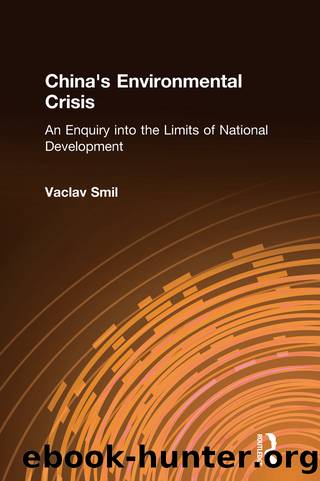China's Environmental Crisis: An Enquiry Into the Limits of National Development by Vaclav Smil

Author:Vaclav Smil [Smil, Vaclav]
Language: eng
Format: epub
Tags: Social Science, Political Science, General, Discrimination
ISBN: 9781315288390
Google: 65AYDQAAQBAJ
Goodreads: 32206073
Publisher: Routledge
Published: 1993-01-01T00:00:00+00:00
China's predicamentâwith absolute annual population increases running well over ten million for the next generation, with its average per capita energy consumption still only a half of the minimum for good quality of life, and with its heavy reliance on coalâwould be especially unenviable. The worst-case scenario would see an unmistakable onset of relatively rapid warming during the 1990s translating into substantial CO2 generation cuts in rich countries, with China becoming the leading producer of the gas before the year 2010, and finding itself under a mounting international pressure to start cutting its emissions.
Ethical issues of such a conflictâdoing away with the wasteful habits of North America and the less flagrant but still clearly extravagant ways of most European nations and Japan versus the provision of basic existential needs for a population increasing by at least 250 million people in one generationâwould be unprecedented. But the population growth cannot be left out of these considerations. Even the most radical combination of realistic technical adjustments would be insufficient without effective long-term controls of population growth.
Looking just thirty-five years ahead from 1990, the United Nations' medium projections forecast a 12 percent larger population in the rich countries and 75 percent growth in the less developed world,100 Merely maintaining the current per capita rates of fossil fuel consumption would then boost the global use by about 30 percentâand so even efficiency improvements, conservation and substitutions cutting away some one-quarter of today's per capita use would not reduce the overall global rate. Although China's population growth rates are moderate in comparison with Africa and Latin America, its absolute annual additions will remain unrivaled during the next generation.
But maintaining the current rates throughout the poor world would be merely extending the existing hardship to another three billion people: if their consumption would increase by 50 percent (that is, still only to one-sixth of the current rich world's mean), and if this were accompanied by a 25 percent reduction in all rich countries, the global 2020 total would still come up one-quarter higher than the recent rate. China's per capita energy use would still be below 40 GJ per year, but the country would be the leading emitter of CO2.
Clearly, the prospects of substantial reductions in the aggregate global rate of fossil fuel consumption during the next generation are highly unlikely. Maintaining the current rate would be a "success," but one achieved at the price of continued impoverishment outside the rich countries. But China cannot be forced to maintain its current CO2 emission levels while trying to accommodate another 250 million people during the next generation: the chasm between these two requirements is absolutely unbridgeable.
Multiple risks and hardships are thus inevitable. Agreement on a concerted global action to curb CO2 emissions needs China's participation; a refusal to take part would make China's international position difficult. Yet China cannot take part with its own resources alone: even with vigorous conservation it will need to expand its energy consumption; consequently, it may profess willingness to participate in a
Download
This site does not store any files on its server. We only index and link to content provided by other sites. Please contact the content providers to delete copyright contents if any and email us, we'll remove relevant links or contents immediately.
Cecilia; Or, Memoirs of an Heiress — Volume 1 by Fanny Burney(32559)
The Great Music City by Andrea Baker(32020)
Cecilia; Or, Memoirs of an Heiress — Volume 2 by Fanny Burney(31957)
Cecilia; Or, Memoirs of an Heiress — Volume 3 by Fanny Burney(31943)
We're Going to Need More Wine by Gabrielle Union(19049)
All the Missing Girls by Megan Miranda(16033)
Pimp by Iceberg Slim(14513)
For the Love of Europe by Rick Steves(14138)
Bombshells: Glamour Girls of a Lifetime by Sullivan Steve(14077)
Talking to Strangers by Malcolm Gladwell(13374)
Norse Mythology by Gaiman Neil(13371)
Fifty Shades Freed by E L James(13244)
Mindhunter: Inside the FBI's Elite Serial Crime Unit by John E. Douglas & Mark Olshaker(9345)
Crazy Rich Asians by Kevin Kwan(9293)
The Lost Art of Listening by Michael P. Nichols(7507)
Enlightenment Now: The Case for Reason, Science, Humanism, and Progress by Steven Pinker(7315)
The Four Agreements by Don Miguel Ruiz(6766)
Bad Blood by John Carreyrou(6623)
Weapons of Math Destruction by Cathy O'Neil(6282)
